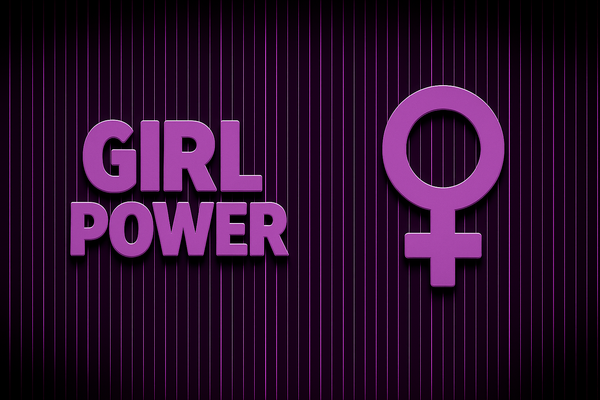💋 Lip Gloss and Liberation: Rethinking the 'Girl Power' Era

If you grew up in the ’90s or early 2000s, you probably remember what empowerment looked like: glitter eyeshadow, low-rise jeans, and the words girl power splashed across everything from lunchboxes to magazine covers.
It was loud. It was fun. And, for many of us, it was our first introduction to feminism - even if we didn’t call it that.
But looking back now, it’s hard to ignore the irony. “Girl power” gave us confidence, yes - but it also gave us consumption. It sold freedom in the form of lipstick and handbags, self-belief packaged as a brand.
It was liberation - with a price tag.
💅 The Era of Empowerment-as-Aesthetic
The ’90s feminism that dominated Western pop culture wasn’t really about dismantling systems. It was about individual empowerment, a message distilled into slogans that fit neatly on a crop top.
You could be anything you wanted - as long as you looked good doing it.
Spice Girls feminism told us to be bold and loud, but not too loud. Magazines told us we could “have it all” - a career, confidence, and perfect hair - but said little about equal pay, childcare, or domestic labour.
Empowerment was personal, not political. Feminism became a vibe, not a movement.
🛍 The Price of “Having It All”
The message was intoxicating: women could now do everything.
But that was the trap.
Instead of dismantling the expectations placed on women, “girl power” layered new ones on top. You could pursue your dreams - but you still had to be beautiful, likeable, thin, and perpetually “strong.”
We were told we could have it all - a career, a home, a family, a social life, and time for self-care - as if balance were just another skill successful women naturally possessed. But what many of us discovered later is that “having it all” often meant doing it all, usually alone.
There was no mention of the invisible labour, the burnout, or the quiet heartbreak of trying to fit a lifetime of expectations into twenty-four hours.
And for those of us now in our thirties or forties, there’s a deeper sting. Many women who grew up in that era internalised the idea that motherhood and career were equal paths you could juggle with the right attitude - only to find that biology, timing, or circumstance had other plans.
We didn’t fail at having it all; we were sold an impossible dream.
And if you struggled under the weight of all that? The magazines and talk shows told you to buy something, fix something, or smile more.
It wasn’t revolution. It was retail therapy.
📺 Magazines, Media, and the Myth of Choice
That impossible dream wasn’t just cultural - it was curated.
The glossy pages of Cosmo and Glamour promised liberation, but within narrow lines. Confidence was encouraged - as long as it was sexy. Ambition was fine - as long as it didn’t make men uncomfortable.
Television picked up the same script. Ally McBeal and Sex and the City gave us career-driven, complex women, but always framed through dating, fashion, and consumption. Their freedom existed in designer shoes, not in policy, protest, or collective power.
And so we grew up believing that choice itself was feminism - that every decision we made, from our jobs to our lipstick, was an act of empowerment. But few of us stopped to ask who really had choices, or why some choices were never on the table in the first place.
🔁 From Girl Power to True Power
This isn’t to dismiss the impact of that era - it did move the needle. For many of us, “girl power” was an entry point into questioning gender roles. It planted seeds.
But it also showed how easily feminism could be co-opted, polished, and sold back to us.
Today’s feminism is messier, broader, and braver. It talks about race, class, disability, sexuality, reproductive rights, unpaid labour, and systemic power. It’s not always marketable - but that’s a sign of progress.
Because true liberation doesn’t need a slogan.
It needs solidarity.
💜 Looking Back with Love (and Clarity)
I don’t regret growing up in the “girl power” era. It gave me boldness, creativity, and the sense that I was allowed to want more. But it also left gaps - the kind you only see when you realise empowerment without equality is just decoration.
So yes, I’ll always have the Spice Girls nostalgia. But I also know now that real power isn’t found in matching outfits or perfect smiles - it’s in collective action, fair systems, and the quiet, stubborn belief that women deserve better than slogans.
Lip gloss fades. Liberation shouldn’t. 💋
Laura Hargreaves
Localisation engineer, language technologist and general tinkerer with opinions. I write about tech, localisation and life on the open web — chasing internet nostalgia and genuine connections online. Cat mum ×2. 🌍💜



